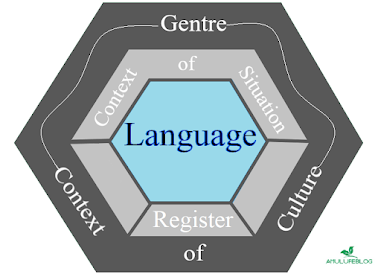Expectedly, when a school leaver hears the word register, it should not be surprising if the first thing that comes to their mind is the typical class register where the teacher shouts ‘John!’ and the mentioned pupil responds ‘Present!’. The register about being discussed below is not in any way close to a class register, but it is close to academic writing where it is noteworthy in our formal dialogues.
The Register in Academic writing refers to the range of language (either written or spoken) used by a group of people with similar interests in a certain context to reflect the level of formality. And this concept of ‘context’ with regards to language is any circumstance in which a text is created, and it may be in a context of culture or context of situation.
As the diagram demonstrated, despite the fact all languages takes place in some form of context that is the context of culture or the context of situation, it’s important to note that both contexts lie outside the language itself (Mills, 2016). The context of culture is linked to the genre (category of communication) while the context of situation relates to the register.
Context of culture: refers to the range of language (either written or spoken) that is centered around the culture of a specific group of people. All of the meanings available to members are defined by the context of culture.
Context of the situation: It refers to a certain situation in which people communicate in a certain context. And these situations are the mode, field, and tenor. Together, they are known as the element of the register.
- The Mode is the channel of communication that is being used. Is it written or spoken? Or persuasive or narrative? And so on.
- The Field is the subject matter of the discussion. Is it about engineering or law? And so on.
- The Tenor focuses on participants’ status or role and the writer-reader or speaker-listener relationship. Is it a temporal or permanent relationship? Is it formal or informal?
The common types of Language register
- Formal register: it follows the common academic writing conventions that prioritize formality and impersonal approaches. Formal writing includes reports, academic essays, official speeches, theses, business letters, etc.
- The informal register: used when one is communicating with family or friends. It may be classified as casual when you communicate with your friends and peers and intimate when you are communicating to close ‘friends’ or relatives mostly in privacy. It is characterized by the use of slang, jokes, contractions, colloquialism etc.
- Neutral register: the language used here does not need to be formal or informal, but it must be objective in nature in order to communicate facts.
All Adapted from:
Davis, B. (2021). What is a register in academic writing? MV Organizing. Retrieved from: here
Mills, J. (2016, January 21). Academic Register [Video file]. Retrieved from: here
Really learn English (no date). Language Register. Retrieved from: here

